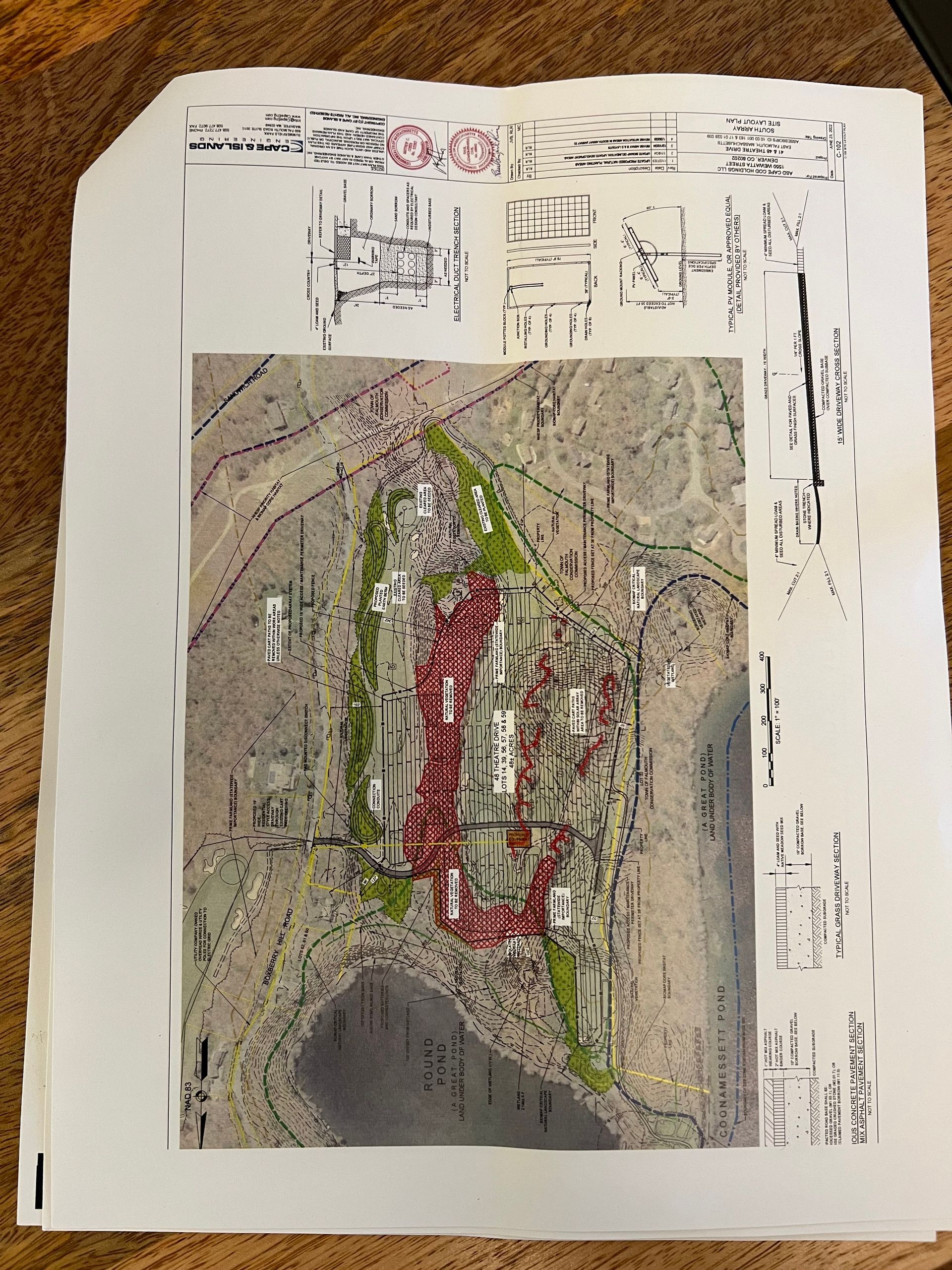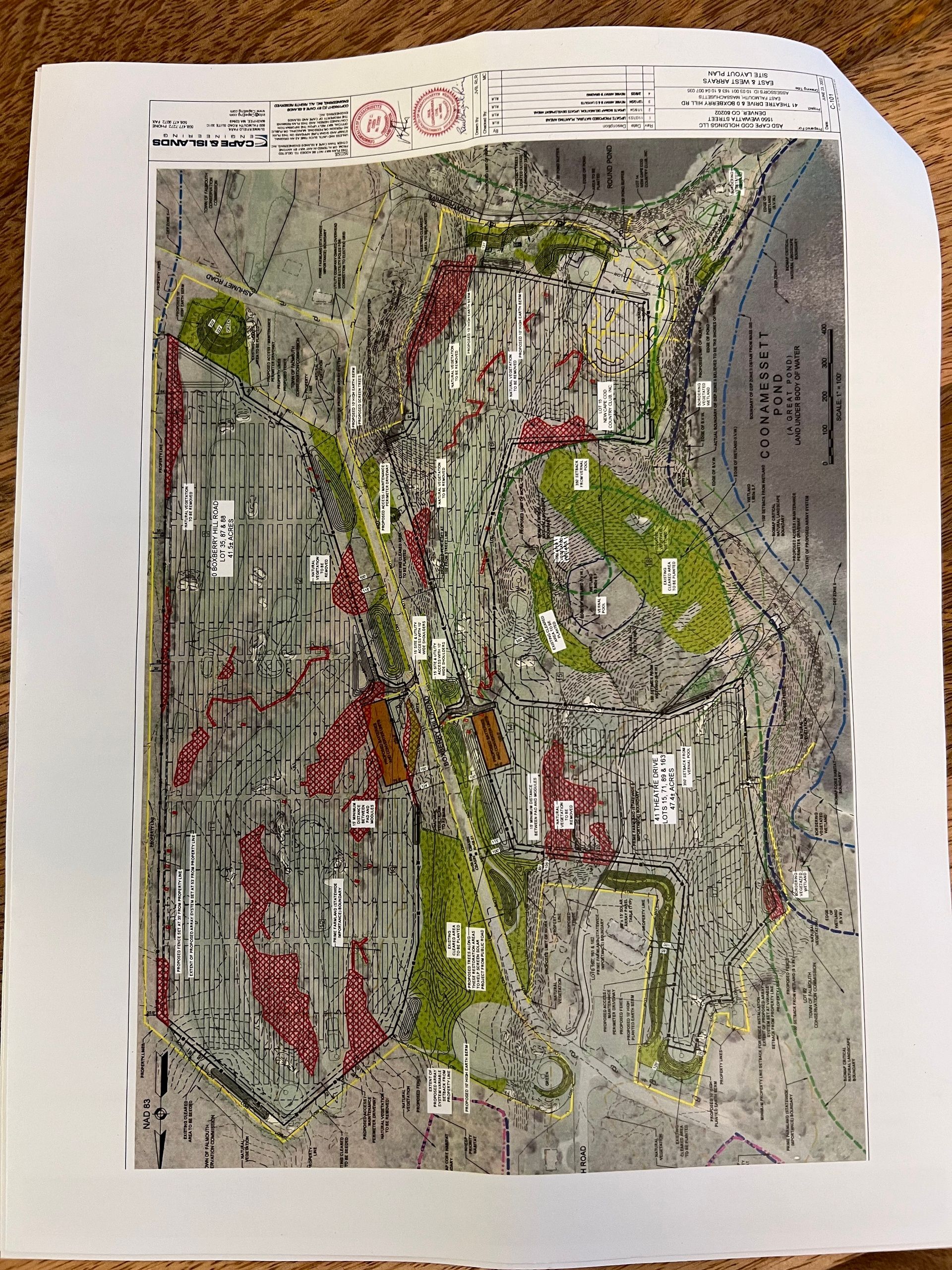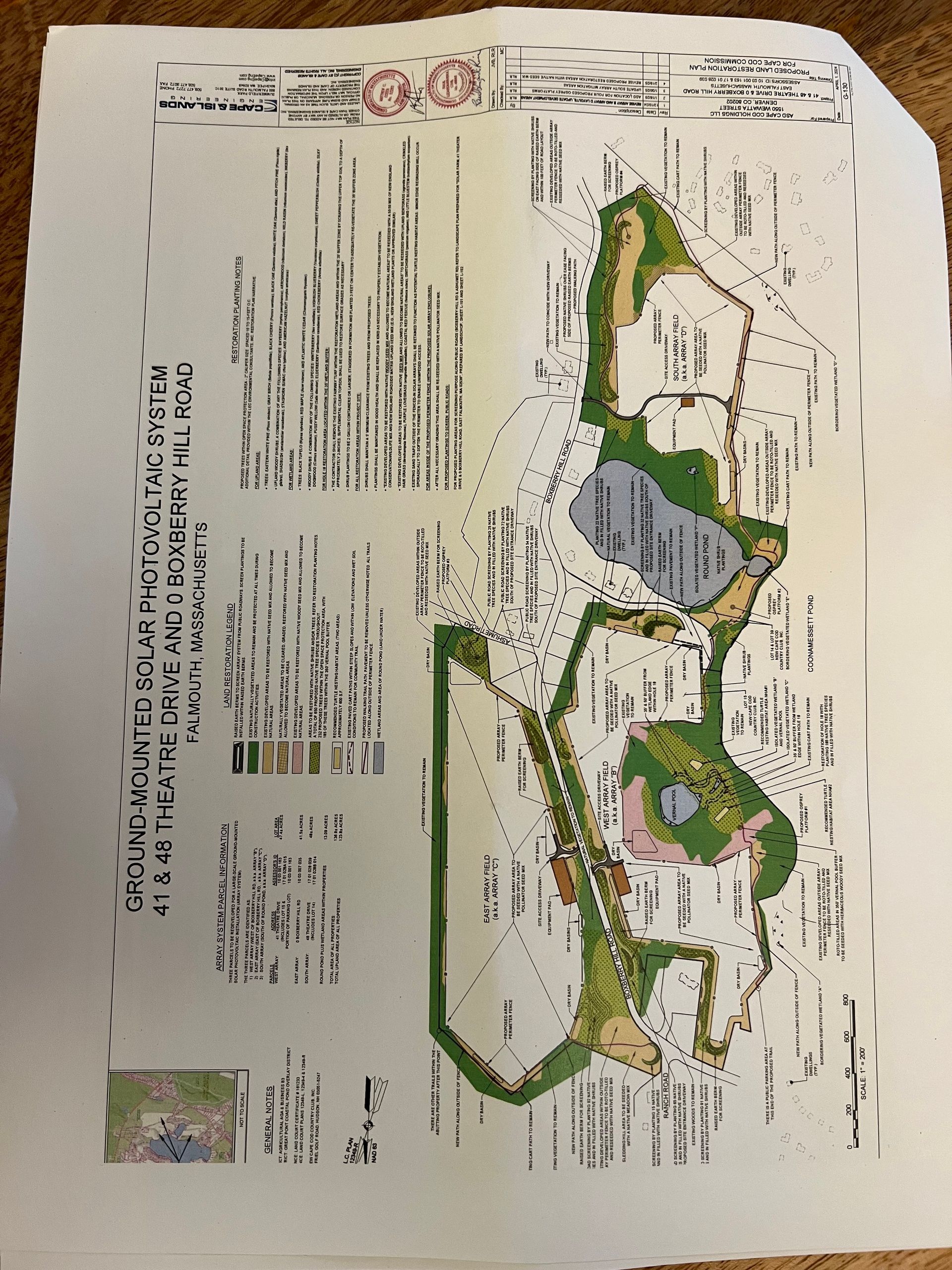This is a reader-supported publication. To receive new posts, bonus content, support my work, consider becoming a paid subscriber.
“You’re not welcome here,” one Cape Cod CC player shouted as he made the turn on a brisk Sunday afternoon in November.
“What are you going to do when the solar panels need to be recycled?” another asked Manjoor Vahora, the lead project developer of the Cape Cod Solar Project for PureSky Energy as walked out of the clubhouse.
After four years of meetings, lobbying, and voting, PureSky hosted a group of 30 people on Sunday, November 2 to walk the grounds at Cape Cod Country Club. Vahora and Corina McCandless led the meeting, but it felt more invite-only than open house. Neighborhood residents and Town Meeting voters made up the brunt of the audience.
What was missing was a local reporter or a larger number of residents who might have heard about the open house if it had been publicized around town.
What was also missing was someone from Friel Golf Management who is selling the land to PureSky.
The goal of the meeting was two-fold. First, it was to show the attendees what the plans are for the land once the final steps are completed in the sale and rezoning of the land for three large solar arrays spread out over the golf course.
Second (and somewhat cynically), it was to check a box to state that they offered a forum for people to learn about the project and voice their opinions.

There were numerous questions about property value, sound pollution, and the long-term impact on the land once the 43,056 solar panels reach the end of their life in roughly 25 years. A 2025 high school freshman will have this issue on their Falmouth Town Hall Meeting docket in 2050 when they are 40 years old.
The Next Generation on the Tee
As the group stood on the 15th green discussing vernal pools and bat boxes, two high school sophomores named Luke and Thomas wandered onto the tee box. They patiently waited for the foursome in front of them to clear before hitting their shots on the par-3 with a small gallery behind them.
“We don’t live in Falmouth,” one of them said. “We heard about the solar field and decided to come check out the course before it closes.”
They drove from West Barnstable and Brewster for a chance to play Cape Cod CC.
“I love it so far. The greens are super cool. So fast,” Luke said with a smile.
These weren’t all-star high school golfers trying to shoot a low score. They were two friends looking for a new course to check out. Luke said he hoped to try out for his high school team next fall.
“We're here because we heard it's a great course for the value you get,” Thomas said.
Regulars, Rituals, and Blue-Collar Golf
While curiosity brings some to Cape Cod CC, it’s a regular haunt for many others. Neil, who had his right arm in a sling after rotator cuff surgery, was spending his afternoon chipping and putting with his right hand.
“This is my therapy,” he said. “I live about a mile that way.”
He pointed across Coonamesset Pond with his putter.
“It’s about a two-and-a-half-mile walk around the pond. I come down here and chip and putt.”
As he does that, folks walk by and check on his progress.
“How’s the arm?”
“When will you play again?”
Some razzed him, including Sly, who is blessed with a smart wit and a quick smile.
“You’re a better chipper with one arm.”
Other golfers aren’t sure where they’ll play if they lose Cape Cod CC. Falmouth CC is bursting at the seams; Cape Club of Falmouth is turning private. In the blink of an eye, the area will lose a high-end course in CC of Falmouth and an affordable option in CCCC.
The price and vibe at CCCC are right for a lot of these blue-collar golfers.
Standing outside with three golfers who had played 18 that afternoon, I asked where they would play if Cape Cod CC were gone.
“I’ll probably just go back to skeet shooting and hunting,” Chris said. “I used to do that, but then I started playing golf and fell in love with it.”
He thought for a moment.
“This just isn’t right.”
If you’d like to show your support for Cape Cod CC, consider buying a shirt. Proceeds are going to Friends of Cape Cod CC.

Echoes of a Lost Era
There’s a tongue-in-cheek saying among golfers who played before COVID:
Shrink the Game.
Sometimes it’s said in jest when drunken fights on a putting green go viral or carts are flipped or rounds take 5.5 hours.
It seems like the Friels might have found the solution:
Close a beloved golf course and take away the supply.
Golfers I spoke to out on the CCCC putting green in their 60s and 70s waxed poetic about the resort and playhouse that used to attract more than just golfers.

“I used to come down here, and I remember live bands, guys playing horns,” one of them said. He mimicked playing a saxophone. “People would be dressed up for a night out.” He pointed across the putting green to where the playhouse used to stand until a fire destroyed it in the 1990s (another story for another day…).
The Coonamessett Inn was a popular spot for a long time.
“They’d fly in on water planes,” one of them said.
(Richard) Aldrich desired his patrons to have a comprehensively luxurious experience. To this end, the playhouse complex contained Leonard Rosenfeld’s elegant Playgoers restaurant, where dancing and entertainment were offered each evening beginning at 9:00 p.m. For the 1952 season, a unique cooling system was added to the theater to insure comfort of the playgoers. Fans brought the cool outside air into the theater and distributed it through ducts placed under each row of seats. Tiny holes allowed the cool air to flow into the theater and fans at the top of the room sent it back outside. Also that year, buses were scheduled from Falmouth Heights to the theater for each performance. In 1956 a more traditional air conditioning system was installed. Even into the 1970s, playbills proudly included the declaration: “Air Conditioned.”
Like everything on Cape Cod, there’s also a tourist angle. Cape Cod CC is one of the best public courses on Cape Cod, and some would argue it has the potential to be one of the best in the state.
In the summer, people return every year on their annual trips with friends to play the course. It’s the anchor for a lot of golfers in the summer, too.
Given the location, an enterprising owner could develop the land into a mini-destination. There’s an abandoned house on the water that could be replaced with a small wedding venue if someone really wanted to get creative (of course, that would come with its own neighborhood issues, too).

They’ve Been Through This Before
Some folks at the meeting recalled a wind turbine program that turned sour very quickly.
“We’ve been through this before,” one woman said as Vahora and McCandless took questions.
In 2022, two turbines were taken down. They hadn’t been in operation for 5-7 years after noise complaints. Some people even had issues with light in their houses, as the turbines cast alternating shadow and light across living rooms and bedrooms.
It cost the town millions to take down and recycle Wind 1 and Wind 2.
And that experience has left some dubious about this new project, which would take a golf course away and alter a neighborhood.
“Once it’s not a golf course, it will never be a golf course again,” Neil said.
PureSky’s Pitch
One way PureSky is trying to ease the loss of green space is with walking trails and a sledding hill. This would all be maintained by the town of Falmouth. They were also sure to remind everyone that this is a community solar project, meaning that the impact of the solar energy created is going back into the immediate community. Residents and businesses will have lower bills.
PureSky are buying the land from Friel Golf Management and donating it to Falmouth. Then they will lease the land from the town for the solar project.
They are also promising turtle nesting habitats, 1 osprey nest on each of the three sites, and cleaner water drainage into the Coonamesset Pond.
Water contamination has been a debated issue, as some believe the golf course maintenance habits pollute the water. Others argue that CCCC has made a considerable effort to manage the course with environmentally friendly practices.
PureSky also wanted to make clear that no land or soil will be removed from the site, but it will be “redistributed on the site.” It’s been publicly stated otherwise that soil and land will be moved and removed to flatten out the more extreme parts of the property.
There was also scuttlebutt and questions about housing being built on one parcel of land that isn’t going to be turned into solar. Vahora didn’t shut down the question about housing on some of the land. It is a possibility on one section that won’t have solar panels.
Some people voiced their fear that it might be a Trojan Horse for more development opportunities in the future. If that is the case, it would undo whatever good is being done now. A selling point for many of the defenders of this project is that the land isn’t going to be a golf course again, and so why not at least keep it from being developed into housing or commercial space.

There is already some housing on CCCC. And some wonder if more will be built.
PureSky argues that their involvement is the least invasive alternative because they have been led to believe that the land will absolutely not be a golf course. Even on their website they have three bullet points about the future of the land below the heading Why Solar, Not Golf?
Owner Perspective: Continuing to run the golf course is not a feasible path forward for the owner.
Purchase Prices: Highest purchase prices come from renewable energy and housing developers.
Benefits Broader Community: The space will not remain a golf course, regardless – developing it for solar is a preemptive choice in-line with local priorities to conserve the land and keep the space for public use.
They also say that housing would add more stress to the town. This solar project doesn’t add sewage and pipelines. It doesn’t add an influx of new students into the school system.
However, in 25 years, it might do exactly that if the land isn’t usable for solar anymore, and the golf course would be gone.
PureSky’s job is to take a piece of land and repurpose it for solar.
It’s About the Seller

Players and the Open House Attendees on the 15th tee box
“I don’t begrudge them,” one CCCC golfer said. “It’s their (PureSky’s) job. But the Friels shouldn’t have sold it to them.”
This is the main bone of contention.
In the eyes of many in the area, the Friels didn’t make a good-faith effort to find a buyer who would be willing to keep CCCC an active golf course.
In an October 9, 2025 Enterprise article, David Frield said the sale was “strictly business.”
In the same article, he also said that he approached The 300 Committee Land Trust ten years ago about a sale, but they weren’t interested.
It’s unclear who was interested in golf property in 2015. The game was spiraling, and the business was tough. Even a sale to a solar field in 2015 might have garnered less attention.
Friel also stated to the Falmouth planning board in 2021, “The expansion of golf courses on the Cape over the past decade or two and the reduction in the number of golfers nationwide has forced me, from a financial viability standpoint, to consider other land use options for the Cape Cod Country Club.”
Golf is booming now, so that quote doesn’t really stand up to scrutiny. It doesn’t mean that the Friels have to keep the golf course, but it means that an effort to sell it might look a little different than it did in the past.
Golf Courses Can Be Saved and Reborn
In recent years, courses that have been lost to time have been revived or reborn due to investors and municipalities who care about the game and want to keep historic sites alive or bring them back to prominence.
Close to home, Hooper Golf Course (Walpole, NH) was bought by 32 residents who didn’t want to see their nine-hole course disappear. Sullivan County Golf Club in New York was saved by author Tom Coyne and some high-powered buddies. They’re even building new holes and creating a community there with movie nights to get people onto the golf course. Coyne’s newest book, A Course Called Home, will detail the project.
Cobbs Creek in Philadelphia is another example, The Park in Florida, and High Pointe in Michigan all needed some ingenuity and effort to get back on their feet.
Cape Cod CC needs saving, but it doesn’t need saving. The course is in great shape. It has a vibrant collection of regulars and a gravitational pull for visitors.
In September, the Cape Cod Commission voted 14-1 in favor of the project. The only dissenting vote was the Falmouth representative. Did the other people vote in favor because they don’t want to be the next solar target for three arrays in their town?
Maybe…
What’s next?
The Falmouth Town Meeting, which is made up of 243 elected officials, will have a vote on November 17 to decide on Article 12 and Article 14.
Article 12 is about Land Use Permit Requirements, and Article 14 is about General Regulations. These votes will likely decide the fate of CCCC. Two-thirds of the Town Meeting will have to vote in favor.
In Falmouth, showing up to the meeting does not grant a resident a vote, but it can show the elected officials which way the wind is blowing. In an October meeting, there was a groundswell of support for the course. It gave some members pause, and they wondered if the process, which had been moving slowly since 2021, had all of a sudden sped up and needed some more consideration given the state of the sport.
Servicing The Golf Population of New England With Zeal
In a Steve Eubanks article in GolfBusiness.com article titled “Continuing a Legacy,” (which is no longer available…), Eubanks wrote:
So, it’s a marvel of the golf course ownership business that the children of Phil J. Friel Jr. not only continued in their father’s footsteps, but that two decades after the patriarch’s passing, Phil’s grandchildren are servicing the golf population of New England with the same zeal that marked their grandfather’s time in the game.
Since that was written, they have sold their 36-hole facility in New Hampshire that Phil Friel built for $121 million to Target. Now they’re looking to eliminate 18 more holes of public golf in Falmouth.
Seems like that zeal is gone.
At the very least, on Sunday they could have shown up to take questions from people about their decision.
If they had, they might have seen two high school sophomores enjoying an afternoon round on a golf course that is nearly 100 years old. It’s a place they aren’t coming to see when it’s walking trails and a sledding hill surrounded by 43, 056 solar panels.
They chose to get in their car to play an affordable, Golden Age golf course. After their round, Luke and Thomas sat down with a Gatorade and watched the end of the Patriots game in the clubhouse before heading home. Who knows, maybe they grabbed something to eat in Falmouth. The ripple effects of a golf course are wide, and this sale would dry up a meaningful oasis in Falmouth.
Thanks for reading. If you’d like to support the Save Cape Cod CC effort, you can buy a t-shirt. All proceeds are going to the Friends of Cape Cod CC.
Here is the handout from the Open House.






